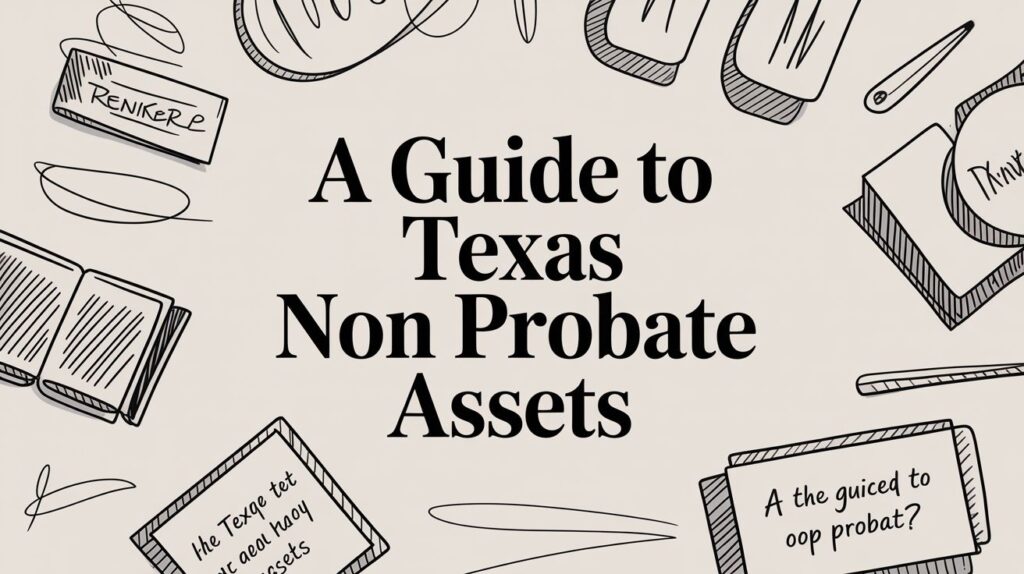Dealing with the death of a loved one is already an emotionally challenging experience. But when real estate is co-owned and becomes part of a Texas probate case, things can become more complicated. Disputes between co-owners often arise as they navigate the complexities of dividing property while balancing personal interests, emotions, and legal responsibilities. In Texas, probate law plays a significant role in determining how co-owned real estate is handled, and understanding these rules is essential for all parties involved. This guide will take you through the ins and outs of real estate co-ownership disputes during Texas probate, offering practical advice and shedding light on the legal process. Whether you’re an heir, beneficiary, or executor, knowing how to manage potential conflicts can make all the difference in resolving issues smoothly.
What is Co-Ownership of Real Estate?
Before diving into the details of probate, let’s clarify what co-ownership of real estate means. Co-ownership occurs when two or more people share legal ownership of a property. In Texas, there are different forms of co-ownership, each with unique legal implications, especially when disputes arise during probate.

The most common forms of co-ownership are:
- Joint Tenancy: In joint tenancy, co-owners have equal ownership shares, and the “right of survivorship” applies. This means that if one owner dies, the remaining owners inherit the deceased owner’s share automatically. Joint tenancy can help avoid probate, but it can also lead to disputes if one party claims that the arrangement was unequal or unfair.
- Tenancy in Common: In this form of co-ownership, each co-owner holds an individual share of the property, which can be unequal. Each co-owner has the right to sell or will their share to someone else. If a co-owner dies, their share goes through probate. Heirs often disagree on how to handle the deceased’s share, which frequently leads to probate-related disputes.
- Community Property: Texas is a community property state, meaning that property acquired during marriage is considered jointly owned by both spouses. If one spouse dies, their share of the community property is subject to probate, unless a will states otherwise.
How Probate Affects Co-Ownership in Texas
When a person dies, their assets (including real estate) generally go through probate unless specific legal arrangements (like joint tenancy with the right of survivorship) are in place. Probate is the legal process of validating a will (if one exists), paying off debts, and distributing assets to heirs or beneficiaries. This process can become particularly complex when real estate is involved, especially if there is co-ownership.
In cases of co-ownership, the deceased’s share of the property enters probate. The probate court then determines how to distribute that share among the heirs or beneficiaries. This situation can create tension between the remaining co-owners and the new heirs, sparking disputes over how to manage, sell, or divide the property.
Common Causes of Co-Ownership Disputes During Probate

- Disagreements Over Selling the Property
Co-owners may have differing opinions about what to do with the property. Some may want to sell the property and divide the proceeds, while others may prefer to keep it for personal use or investment purposes. These conflicting interests can lead to heated disputes, especially if there’s no agreement in place on how to proceed. - Unequal Contributions or Ownership
While co-ownership may appear equal on paper, disputes often arise when one party feels they contributed more to the property’s purchase or upkeep. For instance, one sibling may have paid for significant renovations while another did little to maintain the property. During probate, these grievances can surface, causing friction over how to divide the deceased’s share. - Financial Stress or Debts
Probate involves settling the deceased’s debts, which may include a mortgage or other financial obligations tied to the real estate. If the property is co-owned, questions may arise about who is responsible for covering these debts. Additionally, if one co-owner is financially struggling, they may push for a quick sale, while others may resist selling. - Inheritance and Ownership Rights
When an heir inherits part of a co-owned property, they become a new co-owner, even if they never intended to own real estate. This can create tension, especially if the heir has no interest in maintaining or managing the property. The existing co-owners may not welcome a new partner, particularly if they have differing views on property management. - Unclear or Disputed Wills
Sometimes, unclear wording in the deceased’s will sparks disputes over property entitlements. When heirs contest the will or multiple parties claim the real estate, the situation often escalates into a legal battle.
Steps to Resolve Co-Ownership Disputes During Probate
Resolving co-ownership disputes during probate can be challenging, but there are several strategies that can help minimize conflict and reach a resolution.
1. Negotiation and Mediation
Open communication is the first step in resolving any dispute. Co-owners should attempt to negotiate an agreement on how to handle the property, whether through a sale, buyout, or continued co-ownership. In cases where emotions run high, mediation can provide a neutral ground for parties to discuss their concerns and reach a compromise.

2. Partition Action
When co-owners cannot agree on what to do with the property, one party may file a partition action. This is a legal process in which the court divides the property based on each owner’s share. If the property cannot be physically divided (which is often the case with a single-family home), the court orders a sale and distributes the proceeds according to ownership interests.
3. Buyout Options
In some cases, one co-owner may offer to buy out the other co-owners’ shares to avoid selling the property on the open market. This can be a favorable option for those who want to retain ownership while providing the other parties with their fair share of the estate. However, determining the property’s fair market value and financing the buyout can complicate this process.
4. Court Intervention
When disputes cannot be resolved through negotiation or mediation, the court may need to step in. In probate court, a judge will consider all relevant factors, including the deceased’s wishes, the rights of the co-owners, and the best interests of the heirs. Court rulings can result in the forced sale of the property or the appointment of a third-party administrator to manage the estate.
Legal Considerations for Executors and Beneficiaries
If you’re the executor of an estate involving co-owned property, you have a fiduciary duty to act in the best interest of the heirs and beneficiaries. This involves making impartial decisions, maintaining clear communication, and managing the property responsibly throughout the probate process.
For beneficiaries, it’s important to understand that co-owning real estate comes with responsibilities, including managing the property, paying taxes, and addressing maintenance costs. It’s crucial to communicate early if you don’t want co-ownership and explore options like selling your share or arranging a buyout.
Preventing Future Disputes: Estate Planning Strategies
Proper estate planning can prevent many of the co-ownership disputes that arise during probate. Here are a few strategies that can help minimize conflicts:
- Creating a Clear Will: A well-drafted will can reduce confusion and prevent disputes over real estate inheritance. Make sure your will specifies who will inherit co-owned property and provide clear instructions for handling any potential co-ownership issues.
- Establishing a Trust: Placing real estate in a trust avoids probate entirely and clearly guides the management of the property after death. Trusts can also offer more flexibility in resolving disputes compared to probate court.
- Using a Co-Ownership Agreement: For families or business partners who co-own property, drafting a co-ownership agreement can prevent future disputes. This agreement should outline each party’s rights and responsibilities, how decisions will be made, and how disputes will be resolved.
- Designating Transfer on Death (TOD) Deeds: In Texas, you can use a Transfer on Death (TOD) deed to pass real estate directly to beneficiaries without going through probate. This method can be a simple way to avoid co-ownership disputes by clearly outlining who inherits the property.
Conclusion: Navigating Co-Ownership Disputes During Texas Probate
Co-ownership disputes during Texas probate can be complex, but understanding the legal framework and potential solutions can help you navigate these challenges. Whether you’re an executor, beneficiary, or co-owner, open communication, clear planning, and legal guidance are essential to ensuring a fair and smooth resolution. With the right strategies in place, you can avoid prolonged conflicts and honor the wishes of your loved ones while protecting everyone’s interests.








